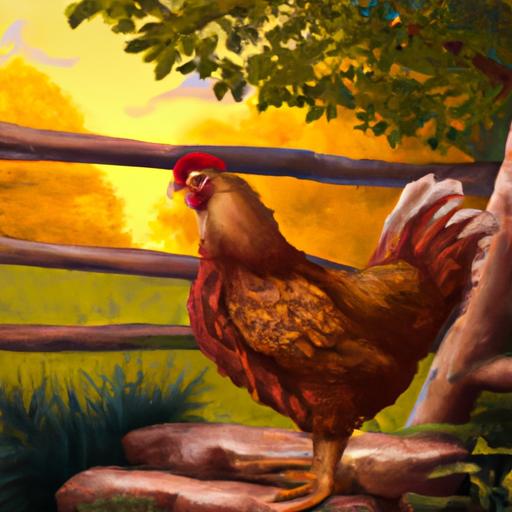Milk has been a dietary staple for humans and other mammals for centuries, and has been an important source of nutrition around the world. But do chickens make milk? Its a question that has been debated for many years. In this article, well uncover the truth of the matter and explore some of the interesting facts and facts about milk production. Well talk about the role of mammals in milk production, the evolution of milk production, the benefits of milk, and some alternatives to milk. So, let’s dive in and uncover the truth: do chickens make milk?
Table of Contents
Short Answer
No, chickens do not make milk.
Chickens are birds and birds are not mammals, so they are not able to produce milk.
Mammals, such as cows, are the only animals that can produce milk.
In some cases, chickens may consume milk and other dairy products, but they are not able to produce it themselves.
The Facts
When it comes to the topic of chickens and milk, the answer is a clear no.
Chickens are not mammals, so they do not produce milk.
This fact has been known for centuries, as chickens have been a part of the human diet for millennia.
But why is this the case?
The lack of milk production in chickens is attributed to a simple difference in biology.
Mammals are the only animals that produce milk in order to feed their young.
This is because they possess mammary glands, which are essential for the production of milk.
Chickens, however, do not have mammary glands, meaning that they are unable to produce milk.
Instead, they produce eggs, which can be used to make various dairy products such as cheese and butter.
So, while chickens do not produce milk, they can still be a valuable source of food.
Eggs are a great source of protein and can be used to make a variety of dishes.
Additionally, chickens can be used for their meat, feathers, and other products.
So, while chickens may not make milk, they are still an important part of the human diet.
What is Milk?

Milk is a nutrient-rich liquid that mammals produce to nourish their young.
It is a complex mixture of fats, proteins, carbohydrates, minerals, and vitamins that are essential for the growth and development of young animals.
It is typically white in color and has a slightly sweet and creamy flavor.
Milk is produced in the mammary glands of mammals, which are special glands located near the nipples.
It contains a high concentration of calcium, which is necessary for strong bones and teeth in growing animals.
Additionally, it is a good source of energy, as it contains lactose, a type of sugar.
Milk is also rich in vitamins A, D, and B12, as well as essential fatty acids, which are important for healthy development.
Dairy Products Made From Eggs
When it comes to dairy products, we often think of milk as the primary ingredient, but did you know that eggs can also be used to make tasty and nutritious dairy products as well? While chickens themselves do not produce milk, the eggs they lay can be used to make various dairy products, such as cheese and butter.
Cheese is one of the most popular dairy products made from eggs.
It can be made using either fresh or processed eggs.
Fresh eggs are used to make soft cheeses such as cream cheese or ricotta, while processed eggs are used to make harder cheeses such as cheddar or Colby.
These cheeses are made by combining the egg whites and yolks with milk, cream, and other ingredients, and then aging them until they reach the desired texture and flavor.
Butter is another dairy product that can be made from eggs.
Eggs are combined with a base of cream or butterfat, and then churned until the desired texture is achieved.
The result is a delicious spread that can be used on toast, muffins, or any other dish that calls for butter.
Eggs can also be used to make yogurt, ice cream, and other dairy-based desserts.
The process is similar to making cheese and butter, except the eggs are combined with milk, cream, and other ingredients, and then heated to create a custard-like texture.
This mixture is then cooled and chilled before being served.
So, while chickens do not produce milk, their eggs can be used to make a variety of delicious and nutritious dairy products.
From cheese and butter to yogurt and ice cream, these dairy products are a great way to enjoy the flavors of the farm fresh.
The Role of Mammals in Milk Production

Its a common misconception that chickens produce milk, but the truth is that only mammals are able to produce milk.
Mammals are animals that have hair or fur and are able to produce milk to feed their young.
This is because mammals have specialized mammary glands which produce milk when stimulated by hormones.
Most mammals have seven to eight pairs of mammary glands which are used to produce milk.
Furthermore, the milk produced by mammalian mammary glands contains essential nutrients for the young and helps support their growth and development.
In contrast, chickens are birds, not mammals.
This means that they do not have mammary glands, and therefore are not able to produce milk.
Instead, chickens lay eggs which can be used to make various dairy products, such as cheese and butter.
Although chickens do not produce milk, they are still an important part of the dairy industry, as their eggs are a key ingredient in the production of many dairy products.
So, while its easy to see why people might think that chickens make milk, the truth is that only mammals are able to produce milk.
Chickens are birds, not mammals, and they lay eggs which can be used to make dairy products, but they do not produce milk.
Evolution and Milk Production
The ability of an animal to produce milk is determined by its evolutionary history.
Mammals are the only animals that are capable of producing milk in order to nourish their young.
This is because the evolutionary process of mammals included the development of a specialized organ the mammary gland which is responsible for producing milk.
Chickens, on the other hand, are birds, and birds did not evolve to have a mammary gland, so they cannot produce milk.
The mammary glands of mammals are nourished with hormones and nutrients from the bloodstream, allowing them to produce milk for their young. Even among mammals, the ability to produce milk is not universal: some mammals, such as horses and rhinos, are unable to produce milk. This is because their evolutionary history did not include the development of mammary glands, while other mammals, such as cows and goats, did.
The ability to produce milk is something that has been shaped by the process of evolution, and it is only mammals that have developed the necessary biological adaptations to produce milk.
Therefore, chickens cannot produce milk, because they are not mammals and do not have a mammary gland.
However, chickens can lay eggs, which can then be used to make various dairy products, such as cheese and butter.
The Benefits of Milk

Milk is a highly nutritious and essential source of sustenance for mammals, especially infants.
It is a complete food, providing the body with essential vitamins and minerals, protein, fat, and carbohydrates.
Milk is also an important source of calcium and other important minerals, which are necessary for the growth and development of bones and teeth in children.
In addition, it is a good source of probiotics, which can help maintain the balance of beneficial bacteria in the gut and help the immune system function properly.
Milk can also help keep the body hydrated and provide a healthy source of energy.
The high protein content in milk can also help build and maintain muscle mass and keep the body strong and healthy.
Alternatives to Milk
Despite the fact that chickens do not produce milk, there are still plenty of alternatives for those looking for dairy-free milk options.
Plant-based milks such as almond, oat, soy, and coconut milks are all excellent substitutes for dairy milk and are widely available in most grocery stores.
These plant-based milks can be used in a variety of ways, including in smoothies, coffee, baking, and as a topping for cereal.
Additionally, there are a number of other dairy-free products such as vegan cheese and yogurt, which can be used in place of traditional dairy products.
For those looking for a more natural alternative to dairy milk, there are also a number of nut milks available.
Nut milks such as almond, walnut, cashew, and hazelnut milks are all excellent sources of calcium and protein and can be used in the same way as dairy milk.
Nut milks are also a great source of healthy fats and are usually much lower in sugar than cows milk.
Finally, for those looking for a more sustainable option, there is a wide range of plant-based milks that are made from a variety of sources such as oats, peas, hemp, and even sunflower seeds.
These plant-based milks are often fortified with calcium and other nutrients and are usually much lower in calories than dairy milk.
Additionally, these milks are often free from added sugars and are certified organic, making them a healthier and more sustainable option than dairy milk.
Final Thoughts
It is undeniable that chickens are not capable of producing milk, like mammals do.
Even though chickens lay eggs which can be used to make various dairy products, such as cheese and butter, they themselves do not produce milk.
With this knowledge, we can better understand the evolutionary history of mammals and the role they play in producing milk, as well as appreciate the benefits of consuming milk or dairy products.
If you are looking for a vegan alternative to milk, there are several options available on the market that can be used to replace dairy products in your diet.

